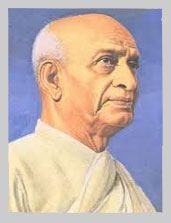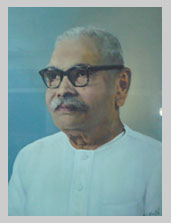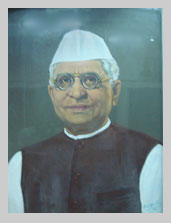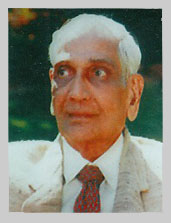Shri Bhailalbhai Dayabhai Patel, fondly known as Bhaikaka, was born on 7 June 1888 at Sarsa in the Anand District of Gujarat state.
Bhaikaka was instrumental in laying foundation of education town Vallabh Vidyanagar and education trust Charutar Vidya Mandal (CVM). He served as founder Chairman of CVM. His Public activities commenced after he had retired from service as an Engineer. A considerable portion of his working life was spent in Maharashtra and in Sind, both areas which were at one time parts of the former State of Bombay Presidency. Because he had a practical bent of mind, whatever work he was entrusted, he tackled in purposive manner and with the first objective of accomplishing it. It was this characteristic of his which endeared him to the ordinary man wherever he served and which brought him to Sardar Patel’s notice.
To Bhaikaka, Sardar’s wish was tantamount to a command. Bhailalbhai retired from Government service and took over as Chief Engineer of Ahmedabad Municipal Corporation. This is not the place to evaluate his work as Chief Engineer in any detail. Suffice it to say that it was outstanding.
His imaginative mind and inherent dynamism would not let him vegetate and he soon plunged into an ambitious new activity. He was gravely concerned about the need for higher educational institutions in rural areas. The men and women living in villages may have available to them facilities at their doorstep. It is noteworthy that until 1947 when we became independent, the higher educational institutions were all located only in large cities.
Bhailalbhai worked out an ingenious scheme. Owners of land would donate land free of cost on condition that they would in return receive a building plot of 500 or 1000 Sq.yards which would be developed around the educational institutions and which would be provided with modern sanitary facilities and piped water supply. The price of the agricultural land at that time was some 300 to 400 Rupees a bigha (1-3/4 bighas equal an acre). The scheme was received enthusiastically and an area of some 600 acres of land was almost immediately offered in the vicinity of Karamsad, Bakrol and Anand. The building plots are today valued at anything from Rs.1 caror to 5 caror according to the location of the plot, The donors had thus the pleasure of helping in the creation of a unique education complex and at the same time profiting financially.
Today there are approximately more than 26 educational institutional, 85 collages and more than 30,000 students are studying in Vallabh Vidyanagar. Bhailalbhai and Bhikhabhai, the two founders, had the satisfaction of the State Government accepting their request for the establishment of a University which started functioning in 1956. Its jurisdiction was deliberately restricted to five miles radius of Vallabh Vidyanagar in the hope that a residential university would develop. As Anand, however, was only 4 miles away educational institutions located in Anand also became eligible for affiliation to the Sardar Patel University as it is now called. Restricted though its jurisdiction is, the University has all the faculties including Medical, which was the last one to be established in 1987. Bhaikaka would have felt happy and satisfied that his and his colleague Bhikhabhai’s cherished project has now been completed. The educational institutions in this University enjoy high reputation for the quality of education imparted and the determined pursuit of excellence.
The township itself has on the whole developed along the lines envisaged by Bhaikaka. Thanks to the lead given by Charotar Gramoddhar Sahkari Mandal Limited, the sister co-operative organization established by the two founders. For infrastructure there has come into being a vibrant and dynamic Industrial Estate which bears the name of Sardar’s elder brother Vithalbhai. The Vithal Udyognagar is a fine example of the benefits that may accrue in terms of employment and general prosperity to a sizeable rural area through this type of dispersal of Industries. The establishment of a Medical College with its essential adjunct, a General Hospital with ultimate bed strength of some 800 has created a virtual township. It is to be hoped that this medical complex will help in developing for a large surrounding area, encompassing several hundred villages, excellent sanitary and healthy conditions.
Bhaikaka and Bhikhabhai, the two founders of Charutar Vidya Mandal and Charotar Gramoddhar Sahkari Mandal Limited, had hoped that education, enlightenment and employment will be secured for the entire rural community, irrespective of caste or creed. That hope, it can legitimately be claimed, has been more than realized. Thousands of boys and girls of all communities have passed through the portals of the educational institutions of Vallabh Vidyanagar. Many thousands from a large hinterland have found work and prospered through the industrial units, large and small, established in Vithal Udyognagar in Vallabh Vidyanagar and Many have gone to foreign countries. And now it is to be hoped that through the Arogyanagar, a healthy life will become possible for an even larger number of people residing in hundreds of neighbouring villages. This information give a fairly comprehensive idea of what Bhaikaka attempted and achieved.
Bhaikaka died on 31st March,1970 in Ahmedabad.






